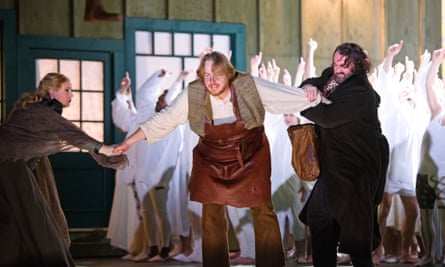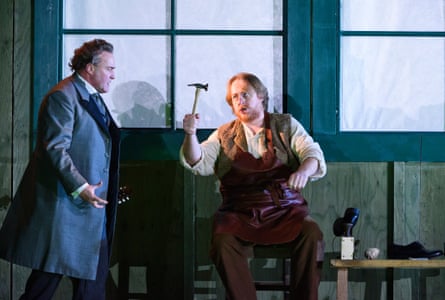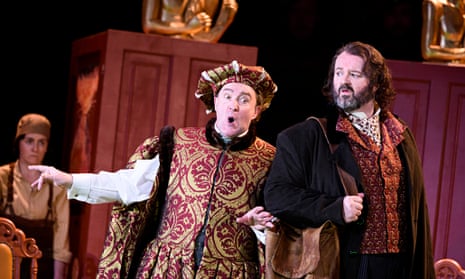Richard Jones’s 2010 production of Wagner’s great comedy has transplanted from Welsh National Opera to London more convincingly than anyone could have dared to hope. Redirected by Jones for English National Opera and now sung in English, it has a lighter touch than one remembers from Cardiff. And, where the original staging seemed built around Bryn Terfel’s commanding, larger-than-life performance in the central role of Hans Sachs, it now seems much more a rounded company achievement, one of which ENO, the target of so much unjustified and unnecessary criticism in recent weeks, can be extremely proud.
At the Coliseum, Iain Paterson is Sachs; his voice may lack the fabulous velvety ease of Terfel, and that fathomless security in the lower register, but Paterson brings an authentically heroic sound and authority to the higher reaches, coupled with a clarity of diction that makes his monologues compelling. There’s a sense of a real person in his portrayal of the cobbler – a troubled man, the natural outsider, who has gained the respect of his peers through his achievements as an artist, but who is still young enough to realise he will be disappointed in his private life. Such a character fits perfectly into Jones’s careful, understated study of social class and the way in which the society of the opera is stratified (even though the mastersingers themselves take such pride in being a classless organisation).

Everything about the production seems sharper, more focused than before. With a few deliberate anachronisms, Paul Steinberg’s designs and Buki Shiff’s often sumptuous costumes depict Nuremberg at the time of the opera’s premiere (1868), but that depiction ranges between almost cartoonish stylisation (the Liberty-print roofs for the street scene of the second act) and meticulous naturalism (the ordered busyness of Sachs’s shop in the third). There are moments of typical Jones surrealism and humour, too – the Nightwatchman (Nicholas Crawley) has more than a touch of the grim reaper; Walther (Gwyn Hughes Jones) gets haunted by a parade of mastersingers wearing song-marking forms over their heads, and the townspeople appear for the second-act “riot” in a splendid array of nightwear.
There’s such skill in the way that all this detail is put on stage, such care put into every performance. Hughes Jones is an ardent, tremendously plausible suitor – played as an older man than usual, which makes Sachs’s unrequited passion for Eva the more touching – while the object of their affections, Rachel Nicholls, gains in assurance as the evening goes on, and launches the third-act quintet with exactly the quiet intensity it needs. James Creswell seems almost luxury casting as Pogner, his singer is so radiant, while Nicky Spence’s David is the perfect blend of impulsiveness and serious ambition; his love for Magdalena (Madeleine Shaw) seems totally truthful. There is Andrew Shore’s Beckmesser, too, full of comic touches that might be his own perfectly judged additions, but which chime perfectly with Jones’s treatment of the character, which is always humane, never cruel.

Binding all this together musically is conductor Edward Gardner. He launches the daunting score with a wonderfully paced and generously phrased account of the overture, and maintains that balance between grandeur and intimacy for the next six hours without faltering, and with fabulously committed singing and playing from the ENO chorus and orchestra. It’s one of the best things he’s done at the Coliseum – which is saying a great deal – and puts the seal on an inspiring evening.

Comments (…)
Sign in or create your Guardian account to join the discussion